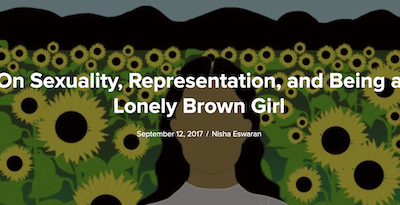Sexual Violence
But not every issue of discrimination and conflict can go to a court.Say for example, affording privacy to a young adult with disability to understand their body and sexual responses, or enabling them to access accessible sex toys or assistive devices related to sexual pleasure.
On the other hand, in Abhay’s newly discovered wonderland, everything seemed to be awfully right. Soon, he began receiving proposals for sex-dates. Initially such proposals shocked him; for it took him a few months to get used to the fact that sex with men was only a click away.
I long for much more than a greater representation of brown women. I long for a complete overhaul of the racial, gendered, and economic systems that structure our suffering.
But I also long for representation of all people, including brown women, who are in love, who are loveable, and who are — in the absence of love — lonely.
Sharp and evocative, Kalki Koechlin’s spoken-word poem The Printing Machine lays bare the cycle of ceaseless and desensitised consumption engendered by the media. Kalki’s short and hard-hitting sentences, keys tap-tap-tapping, and the chrrs and grrs of printing machines bring out the urgency and sensationalism media narratives embody, turning incidents of violence into a stream of headlines that make us gasp and forget, gasp and forget.
It is the winter of 2013, and my father and I are sitting at an awkward distance from each other…
What vindicates the argument that women with disabilities (WWDs) should be deprived of sexual and reproductive healthcare and rights is scary. Harmful stereotypes of WWDs include the belief that they are hypersexual, incapable, irrational and lacking control. These narratives are then often used to build other perceptions such as that WWDs are inherently vulnerable and should be ‘protected from sexual attack’.
A space can make us feel constricted or liberated, and sometimes even both at the same and at varying times. The combination of spaces that we may be occupying in the moment, as well as those we have in the past, predisposes us to act, feel and experience our sexuality in different ways.







